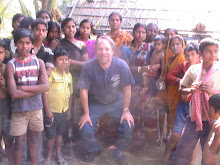India can expect the media's "Israel treatment"
What is the media's "Israel treatment"? It is the imposition of a general narrative over the situation, which then mandates that all events be interpreted within its framework; all editorial decisions about what gets covered (and what does not) and how it is covered must come out of that narrative. Matti Friedman, who was an Associated Press reporter and editor in its Jerusalem bureau from 2006-2011, has done an excellent job of describing how that narrative works to mislead populations whose misinformed actions then seem to validate this "narrative construct that is largely fiction." How would such a narrative work to distort any actions India might take to save Hindus in Bangladesh?
The media and its slavish followers have decided that Indian Prime Minister Narendra Modi is a "bad guy" and that Bangladesh is a "moderate Muslim country," both of which are as far from the truth as one can get. If PM Modi is a bad guy, so must be the overwhelming number of Indians who gave him a landslide mandate in the world's largest democratic election ever. Moreover, I have the pleasure of knowing him and know that he is sincere in his aspirations for his nation and all of its people. On the other hand, Bangladesh has fallen under the grip of Islamists, who now control most of its major institutions. (Al Qaeda and ISIS have recently opened offices there.) Another of the media's cherished myths is that the current party in power, the Awami League, is the "good party," as opposed to its major opponent, the BNP, Like the rest of the narrative, that too does not stand up to the reality of ongoing ethnic cleansing of Hindus and others in Bangladesh with the government's tacit support.
Here is one example of how the narrative distorts reality to make good guys into bad and bad guys into good. Earlier this year, I was in Assam's tribal areas and observed the cultural and ecological damage massive infiltration from Bangladesh has brought to the region. Forests are being destroyed, poaching is bringing both the elephant and one-horned rhino to the brink of extinction; the natives' children are being sent out of the area for their safety with the parents having little hope that they will return to their tribal culture; an ancient way of life and the ecology that supports it are dying, and the people in the area are restive. On several occasions, that restiveness has erupted into violence (I've interviewed several elderly tribal victims of the violence); and the only thing preventing another, major eruption is the people's expectation that new Indian PM will protect them. Yet, I told tribal leaders earlier this year that if they try to expel illegal infiltrators, the media will feature "bedraggled refugees," alleged victims of "nationalists." Moreover, no major media outlet has covered the devastation to their land and way of life--even after Bangladeshi PM Sheikh Hasina promised a continued flow of illegal aliens to Assam.
The media has left India with three difficult options. It can cave into the narrative in an attempt to avoid criticism at the price of its people's safety. It can ignore the narrative and hope that one day people will recognize the reality of the situation. It can attempt some hybrid that probably leans toward the second option but attempts to mollify its critics. If the Israel experience is any guide, the first option is a disaster and will only invite more anti-Hindu rhetoric; and the third will prevent India from achieving the goals it wants to in order to protect its people. The second road is a tough one that brings potentially high political costs to the leader who follows it. My own sense is that after centuries of other nations--first the mughals then the British then the West in general--treating India in a patronizing way and lecturing it on right and wrong; India is about to flex its muscles under Prime Minister Narendra Modi and take its rightful place as a world economic, cultural, and military leader. How it handles the flood of infiltrators from Bangladesh, the Prime Minister's pre-election promise to protect neighboring Hindus from ongoing and state-supported persecution, and similar matters will test its mettle in the face of the narrative makers.
Labels: Assam, Bangladesh, India, Israel, matti friedman, Narendra Modi

